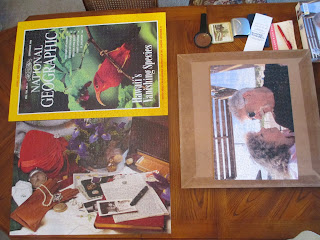Did I tell you about the time we had but one bird and thirty-five people for Thanksgiving? Well, your Aunt Grace decide we gonna be thankful whether we had anythin' or not. She didn't miss hardly a fambly member, sayin' to 'em all, "We gonna have Thanksgiving over to our place this year. Jep and me has been blessed, and we'd be disappointed you didn't join us." Now in the manner of the times, I guess we had been blessed. We was still alive, and we managed to scrape somethin' together each day to keep our souls connected to the bodies.
It was Dust Bowl days, doncha know, and nobody had much a nothin'. We was much better off 'n many around us, 'cause we had saved a little coin which I had failed to put in the bank back in '29. Always was a bit leery them suited guys with they green visors. So anyway, we weren't total broke, and I gone up to Canon where I was able to get a few things, couple hunnert weight a cracked corn, hunnert pound a cornmeal, pinto beans, enough for the whole town. So it looked like beans and cornbread for some time to come. I'ma thinkin' you was maybe three, four years old at the time, 'cause your Mama and Daddy come on down for Thanksgivin'.
Anyways, when I left Canon to come on home, I stopped by Arly's over to Florence and wha'd'ye reckon? Ol' Arly had hisself half-dozen turkeys he'd been nursin' along. Scrawny they was, too, eatin' what they could scratch up. Arly give me one a them birds, insisted I have it, so I tuk hit. Well, I bring that bird home, and glory be! I have all that cracked corn and two months 'til Thanksgiving. Well, son, I kept that bird pretty close, pen him up in the ol' tool shed. Yessir. Fed him good and give him more water than I tuk myself. Well, talk about surprises! When people start gatherin' in our house on that Thursday mornin', the aroma like to knock 'em down, hit smell so great. Some a the fambly had had little enough, and then some, when it come to meat in Lord only knows when.
Well, your Aunt Grace had kept the winders sheeted over purty good, and the sugar and flour were kept wrapped tightly and inside half-gallon Mason jars. Couldn't set out a sugar bowl, nor even keep it in a cabinet, 'cause even with a lid on hit, the dust would just natural get inside. Gritty sugar ain't fit'n to use. So Grace had been bustlin' around two days gettin' fixed for dinner on Thanksgivin'. Now she only invited people to come, she never ask them to bring anything, but they all come with they hands full, and those ladies were bringin' the best they had. Why Marcella Dean, you know Marcella, her'n Larry brought they six kids along, but Marcella make the best "apple" pie you can imagine from nothin' more'n pie crust, sody crackers, and vinegar and sugar. I don't rightly know how she done it.
Anyway, the feast was on, and Grace would have it no other way but that she would make a little speech afore we et. And she lay it on. She said as how times had been bad for a long time, and some folk was gettin' discouraged. Why the whole Palmer tribe, she says, done lit out for Cally-forny, and if we was all givin' up, wouldn't be nothin' here no more but tumble-down shacks and rattlesnakes. And wouldn't you know, like right on cue in a stage play or somethin', Fred Baker speaks up and says, "Let the snakes have 'er. She ain't no good no more no how."
And Grace let him have it. "That," she says, "is just what I'ma talkin' 'bout. This is Thanksgivin', and y'all need to be thankful. Be thankful that we are still a makin' it. Be thankful that we have loved ones who care about us and would give the shirt off'n they back to he'p ary one of us. Y'all buckle in, keep the faith, he'p one another and pray, I mean pray like you believe the promises of God, and pray some more, day and night. We will be okay. Now Darryl, please to offer thanks to the Good Lord over these vittles, and we'll tuck into 'em!"
So right then and there the prayer meetin' start, but hit warn't so drawed out thet the food get cold! No sir, we done justice to that spread, let me tell you. And that bird with the fixin's fed them thirty-five people plum easy. And the prayin' continue, and behole, the very next Fall the drought breaks and the rains come. And then, well we are still here, hain't we?
©
2013 David W. Lacy



.jpg)

















